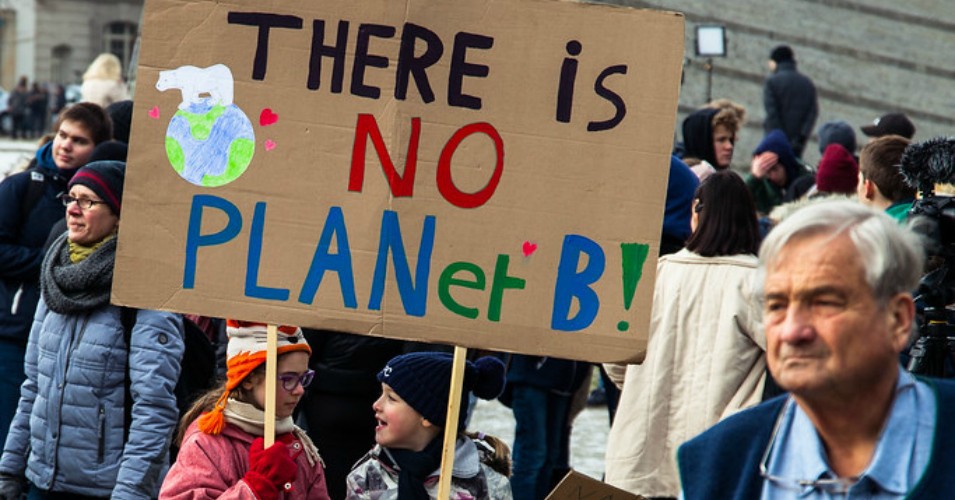
Let’s admit it: We are indeed mad creatures.
This should truly have been the time of our discontent. The northern hemisphere just experienced the hottest summer in recorded history, including month by month the warmest June, July, August, and (by a country mile) September ever. Staggering heat records were set in place after place globally. Fires from Canada to Hawaii to Europe broke all records. (In fact, those Canadian summer fires are now threatening to burn straight into the winter months for the first time — and I fear this phrase is going to be become all-too-boringly repetitive — in history.) The southern hemisphere had a “winter” from — yes! — hell. In Europe, which was burning up, Greece experienced unprecedented fires and floods as well. Libya had a significant part of a major city washed away. China, too, experienced unprecedented flooding around its capital, where 1.2 million people had to be evacuated, and in Hong Kong, too. The sea ice in the Antarctic fell to the lowest levels (yes again!) in recorded history, as did sea ice in the Arctic, helping to ensure a future in which rising sea levels could flood coastal cities. And Greenland has been lending a hand to that same future, starting 2023 with temperatures unmatched in at least 1,000 years and still setting new temperature records in July. Worse yet, that’s just to begin down a list that increasingly seems unending.
In certain parts of my own country, the United States, this summer was all too literally a hell on Earth and, as a New York Times piece headlined it recently, also “A Summer Preview of the Future; Floods, Fires, and Stifling Heat.” (Its first line: “It felt like the opening minutes of a disaster movie.”) A stunning heat wave, for instance, stretched across a drought-stricken Southwest all the way to California, while Phoenix, Arizona, hit an almost unbelievable temperature record of 54 days of 110-degree heat or higher! (Oh, wait, make that 55!)
And that, of course, was just to begin down a seemingly endless list. I haven’t even mentioned disappearing mountain glaciers or the soaring temperatures of South Asia or the Middle East. (Iran hit a record heat index temperature of 158 degrees in August.) But let me stop there. It isn’t hard to see that, if we humans continue to use staggering amounts of fossil fuels and so pour ever more greenhouse gasses into the atmosphere — and the latest study indicates that they are heading in that direction at record levels — the Earth, or at least life as we humans have known it on this planet, will, in the long run, almost literally go down in… what else?… flames.
No, it’s not that nothing is being done. Non-carbon-producing forms of energy are indeed on the rise globally (even in an oil heartland like Texas). Still, to take one example, China, the country moving most dramatically to create ever more green power, is also burning more coal than the rest of the planet combined and still planning to up its use of that devastating source of energy. And keep in mind that, these days, the two greatest greenhouse-gas-producing nations, China and the United States (which is also cumulatively by far the greatest in history), have in recent years hardly been able to exchange a civil word, no less collaborate to try to make this planet a cooler, better place. At the moment, it seems as if they stand a far greater chance of going to war with each other (while incinerating yet more fossil fuels and so much else in the process) than allying to help save the planet as we know it.
Meanwhile, of course, the giant fossil-fuel companies have been making — I know this sounds like a broken record but what can I do? — record (oops, sorry!) profits. And keep in mind that, in the United States, the leaders of one of the two major political parties are wildly focused on supporting and expanding Big Oil and carbon-producing energy sources of every kind, while denying that much of anything I’ve described above is actually happening. Worse yet, according to the latest polls, their unofficial leader, Donald Trump, stands a rather chilling (or do I mean boiling?) chance of retaking the presidency in 2024 and controlling the government for at least four more wildly unpredictable, possibly ever more authoritarian years of carbon hell. Under the circumstances, you might indeed be able to kiss this planet goodbye.
War Is Us
And worse yet, with our increasingly dire global situation in mind, ask yourself this: How is humanity reacting to the deep dangers we now face? Are we focusing our attention on putting out the flames, so to speak? I’m afraid — despite the heroic efforts of any number of young people — the overall answer would have to be: Not on your life! Sadly enough, instead of facing the crisis of climate change head-on, much of humanity seems all too intent on starting fires of the kind that have defined us since time immemorial. I have in mind, of course, a different kind of planetary destruction entirely: war-making. In fact, sometimes that seems to be by far our greatest, if grimmest, skill and deepest nature.
At a moment when peace couldn’t be more needed so that we could focus on our imperiled future, war (and the threat of ever more of it) seems once again to be what we’re all too willing to put at the very heart of things, including of our news reports.
Consider war, in fact, our other version of burning the planet up. Once upon a time, that would simply have been a metaphor for destructive war after war after war throughout human history, but no longer. After all, as anyone who saw the hit film Oppenheimer knows, back in 1945, this country first figured out how to create a global fire that could, unlike climate change, consume our world in essentially no time flat. I’m thinking, of course, of nuclear weapons, and of the fact that their power to broil us (as well as, all too ironically, drive us into a potentially devastating nuclear winter) has only increased immeasurably with time. The weapons in nuclear arsenals now are generally vastly much more powerful than those two atomic bombs that decimated the cities of Hiroshima and Nagasaki on August 6th and 9th of that year.
Almost 80 years later, nine countries have nuclear weapons and the U.S. is planning, in the decades to come, to put up to $2 trillion into “modernizing” its own nuclear arsenal, with the Russians and Chinese following suit. Worse yet, lurking behind the most recent full-scale war on planet Earth, the one in Ukraine, has been the possibility that such weaponry could actually be used on a battlefield for the first time since 1945. I’m talking, of course, about “tactical nuclear weapons” — some far more powerful than the atomic bombs that took out Hiroshima and Nagasaki — and the Russian president’s implicit threats to use them.
And that bloody disaster of a conflict, launched with Vladimir Putin’s invasion in February 2022, has now become a full-scale, World War I-style trench war (with the addition of course of so many modern advances like drones) that shows no sign of ending in any imaginable future. And if that war — and other conflicts, in places ranging from Sudan to Pakistan — weren’t enough for you, then how about the now-ongoing Hamas-Israeli nightmare in the Middle East?
Yes, in its surprise assault on Israel, Hamas brutally slaughtered young music festival attendees in startling numbers and an unnerving number of children as well, while Israel is now mercilessly battering Gaza with its trapped two million inhabitants (almost half of them children), hitting schools, hospitals, and mosques, while cutting off electricity and food which, as Senator Bernie Sanders noted recently, is a “serious violation of international law.”
No less grimly important, that disastrous struggle has become a focus of almost all the news shows in a way that would be inconceivable for the long-term danger of climate change. And no one yet knows how that conflict might still develop or spread, but consider it symbolic of so much else that, in response to the initial Hamas surprise attacks, the Biden administration’s idea of restoring peace in a wildly conflict-ridden Middle East was to send in an aircraft carrier task force and fighter planes. I mean, what else could we do?
And mind you, even when we’re not at war, the U.S. and other countries remain all too ready to invest so much more of our wealth in our militaries than in tamping down climate change. Yes, give Joe Biden some credit, he did oversee the passage of the Inflation Reduction Act, which over time will put several hundred billion dollars into developing a climate-change-ready economy.
Still, that could be his only major climate initiative and investment (thanks significantly to a Republican House) in his four years in office, while every year he’s president the American military has gotten or will get a budget of more than $800 billion (and still rising toward the trillion-dollar mark). Similarly, when aiding allies, as with Ukraine, we’re far more likely to give them billions of dollars for armaments and other kinds of militarized help ($75 billion in the case of Ukraine) than to aid them in battling the growing nightmares of global warming.
Will Humanity Go Asteroidal?
You could say that, historically speaking, as well as in the present moment, war has been both humanity’s foremost talent and our obsession, and that we are, in some basic sense, mad creatures. War still remains a deep and endless part of our world. Making war, in some sense, could be considered our thing. I myself was born in the midst of the second devastating global war of the last century and I’ve lived through American wars in Korea, Vietnam, Afghanistan, and Iraq (twice), as well as that endless war on terror.
So, this is us. But here’s what’s different in this moment: while we humans prepare for and all too regularly launch wars, this planet is now visibly making war on us. Global warming is, in some fashion, a slow-motion but increasingly horrifying assault on this planet as humanity has known it these last thousands of years.
Or rather, if you want to think of it this way, humanity is now making war on itself, using fossil fuels as its slow-motion weapon of long-term atmospheric devastation, while distracting itself with more localized wars on this planet. And thanks to that, it has no longer become totally absurd to talk about our possible extinction. In a sense, you might say that, with our own special form of brilliance, humanity has managed to create both a devastatingly fast and a spectacularly slow way of doing ourselves (and so much else) in. I’m talking, of course, about those nuclear weapons and climate change. And thanks at least in part to our inability to stop fighting wars among ourselves, we seem to be ensuring that climate change won’t be the full-scale focus of our attention as it should be.
So, think of those nukes and climate change as fast and slow-motion versions of that asteroid that took out the dinosaurs and so much other life on Earth 66 million years ago.
At least, however, T-Rex and its pals weren’t responsible for the force that made them history. If things don’t change on this planet in the decades to come, the same might not be true of humanity. You would, in fact, have to say that we might have created our own asteroid, sent it on a devastating slow-motion path to Earth, and then (to make matters worse) largely ignored its coming and began killing each other first.
Consider all of this, then, the deepest form of human madness and just hope that somehow, from the Middle East to Ukraine, Beijing to Washington, we can wake up to what we’re doing to ourselves before it’s too late.
Tom Engelhardt created and runs the website TomDispatch.com. He is also a co-founder of the American Empire Project and the author of a highly praised history of American triumphalism in the Cold War, The End of Victory Culture. A fellow of the Type Media Center, his sixth book is A Nation Unmade by War.
Originally published in TomDispatch.com
Copyright 2023 Tom Engelhardt















































